Book contents
- Frontmatter
- Contents
- List of Figures and Tables
- Acknowledgments
- 1 Introduction
- 2 Political Risks in Oil Investments: A History of Antagonistic Interdependence Between Companies and Host-Governments
- 3 With or Without Democracy? The Political Economy of Foreign Direct Investments
- 4 Curse or Blessing? Effects of FDI on Development
- 5 Azerbaijan: One-Stop Shopping
- 6 Russia: Two Steps Forward, One Step Back
- 7 Norway: Icon of Stability
- 8 Beyond Three Cases and Oil
- 9 Conclusion
- References
- Index
7 - Norway: Icon of Stability
Published online by Cambridge University Press: 03 May 2010
- Frontmatter
- Contents
- List of Figures and Tables
- Acknowledgments
- 1 Introduction
- 2 Political Risks in Oil Investments: A History of Antagonistic Interdependence Between Companies and Host-Governments
- 3 With or Without Democracy? The Political Economy of Foreign Direct Investments
- 4 Curse or Blessing? Effects of FDI on Development
- 5 Azerbaijan: One-Stop Shopping
- 6 Russia: Two Steps Forward, One Step Back
- 7 Norway: Icon of Stability
- 8 Beyond Three Cases and Oil
- 9 Conclusion
- References
- Index
Summary
Oil came as a surprise to Norway. In 1962, when Phillips Petroleum Company announced its intentions to explore the Norwegian coastal waters, many were skeptical about the venture even to the extent that a geologist, in disbelief, said that he would drink oil if it were found. With no prior experience and expertise, the country in less than a decade established a broad national competence in oil with significant contributions from foreign companies in terms of capital, expertise, and technology. Most of the major multinationals have been involved in the development of Norwegian oil, among them BP,ExxonMobil, Royal Dutch/Shell, TotalFinaElf, Phillips Petroleum Company, and Conoco. U.S. Department of Energy described the development of the Norwegian oil industry as a “grand-scale clubbing together” of the Norwegian state and the world's largest oil companies.
According to one account, between 1971 and 1996, a total of US$200 billion was invested in exploration, construction, and operations on the Norwegian continental shelf. In the first offshore licensing round in 1965, the foreign share of the oil fields was 91 percent. Over time, however, with the maturing of the national industry, the balance between Norwegian-owned and foreign companies changed significantly. In 2001, for example, the foreign companies operated roughly 20 percent of the oil resources in producing fields.
- Type
- Chapter
- Information
- Foreign Investment and Political RegimesThe Oil Sector in Azerbaijan, Russia, and Norway, pp. 183 - 215Publisher: Cambridge University PressPrint publication year: 2010



